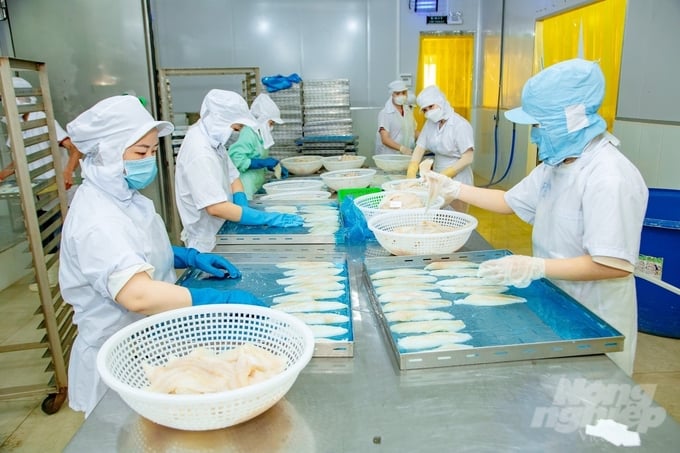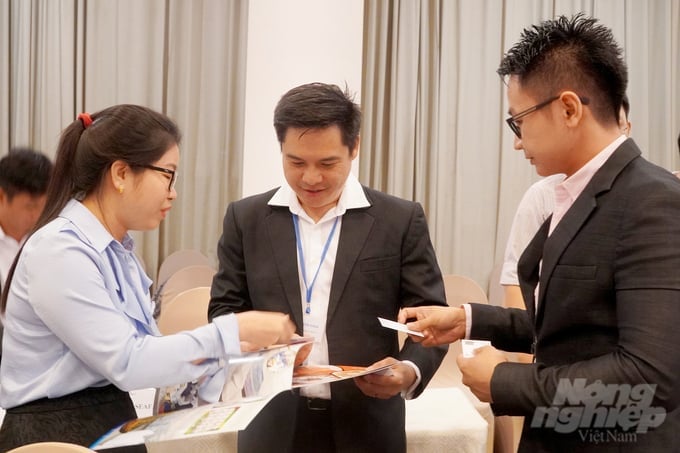June 18, 2025 | 00:28 GMT +7
June 18, 2025 | 00:28 GMT +7
Hotline: 0913.378.918
June 18, 2025 | 00:28 GMT +7
Hotline: 0913.378.918
According to To Thi Tuong Lan, Deputy Secretary General of the Vietnam Association of Seafood Exporters and Producers (VASEP), Vietnam's seafood exports to Singapore reached 35 million USD in the first five months of 2024, marking a decreaes of 5% compared to the corresponding period in 2023.
Singapore currently imports seafood from nearly 100 countries and territories around the world. Major seafood exporters to Singapore include Malaysia, Norway, Indonesia, China, and Vietnam. Notably, Vietnam is the fifth-largest seafood exporter to Singapore, with key exports including shrimp, shark catfish, and tuna.

The shark catfish is one of Vietnam's primary exports to the Singaporean market. Photo: Nguyen Thuy.
Cao Xuan Thang, Commercial Counselor and Head of the Vietnam Trade Office in Singapore, stated this country can only produce 10% of its food supply, including seafood, domestically, with the remaining 90% consisting primarily of imports. Singapore is a significant trade and transshipment hub for export shipments to various regional and global markets worldwide.
As a multicultural nation that with an extensive demand for seafood, Singapore is renowned for its extensive restaurant, tourism, and hotel industry. Consequently, the country's seafood consumption is projected to follow an upward trend in the near future.
"Singapore has signed trade agreements with 15 partners worldwide. This is an advantage that Vietnamese businesses can utilize to export seafood and other agricultural products. As an alternative to individual markets, businesses can establish connections with a single regional hub. This approach saves on the costs of introducing and promoting brands globally," Commercial Counselor Cao Xuan Thang recommended.
The Counselor also noted that Vietnamese seafood products are gaining an increasingly prominent presence in Singapore. Additionally, these products are gaining recognition through exhibitions and trade promotion activities.
"Singaporeans praise Vietnamese seafood products for their value and quality," Commercial Counselor Cao Xuan Thang commented, adding that Singaporean businesses are currently visiting Vietnam to purchase or invest in the fisheries sector in order to promote exports to other countries.
VASEP, Ho Chi Minh city's Department of Foreign Affairs, and various embassies in Vietnam have recently actively promoted commercial activities, established connections, and fostered friendly cooperation in order to boost trade and investment between Vietnam and Singapore in the fisheries sector. This initiative has contributed to increasing Vietnam's export market share in Singapore, and providing Singapore with opportunities to expand investment and business activities in the Vietnamese market.

Kenneth Chia, President of the Seafood Industries Association Singapore (center), discussing with Vietnamese seafood businesses. Photo: Nguyen Thuy.
With support from the Ho Chi Minh city's Department of Foreign Affairs and the Vietnamese Embassy in Singapore, a delegation of companies from the Seafood Industries Association Singapore held a meeting with VASEP, and engaged in trade connections with Vietnamese seafood companies on June 25 in Ho Chi Minh city.
"During this visit to Vietnam, we will act as a bridge between the Seafood Industries Association Singapore and the provinces of Ba Ria - Vung Tau and Nha Trang; so they can discuss Singapore's demand for a supply of seafood products," stated Commercial Counselor Cao Xuan Thang.
Commercial Counselor Thang noted that Singapore imposes virtually no technical barriers to restrict imports and is willing to pay higher prices; however, it maintains strict quality control measures.
"We must make an effort to continue maintaining the quality of our products. This is an advantage for Vietnamese seafood and agricultural products. Issues with product quality, such as antibiotic residues or microorganisms, can cost a Vietnamese company's access to the Singaporean market," Commercial Counselor Thang emphasized.
Kenneth Chia, President of the Seafood Industries Association Singapore, stated that his first visit to Vietnam involves discussions with businesses, traders, and international product investors that possess extensive experience in exporting to major markets worldwide.
The Seafood Industries Association Singapore aims to collaborate with Vietnamese seafood businesses and VASEP to ensure food security for Singapore while facilitating Vietnamese seafood exports to Singapore and other markets around the world.
Nguyen Van Tho, Chairman of the Ba Ria - Vung Tau Provincial People's Committee, noted that the province is currently managing 53 Singaporean investment projects with a total registered capital of nearly 3 billion USD, placing Singapore among the top 10 countries with the highest investment capital in the province. These projects primarily operate in maritime services, port exploitation, fertilizers, food, construction materials, electricity, and mechanical engineering.
On the other hand, Ba Ria - Vung Tau currently houses 175 seafood production and trading businesses. Among this group, 54 businesses are qualified to participate in the seafood export certification program for exports to the EU, the Eurasian Economic Union, the United States, Russia, Japan, South Korea, and the Middle East. Moreover, these businesses have met various standards and quality requirements, including HACCP, ISO 22000, Halal, IFS, and BRC.
Translated by Nguyen Hai Long
/2025/06/17/2344-1-131758_261.jpg)
(VAN) Amid tariff risks and growing trade barriers in the U.S. market, Australia is emerging as a promising destination to sustain the growth momentum of Vietnam's shrimp exports.
/2025/06/17/2013-1-nongnghiep-112009.jpg)
(VAN) This notable growth trend reflects the global taste for fresh, nutritious fruits and the expanding use of lychees across various sectors.

(VAN) The political and cultural insulation of Japan’s beloved grain is falling apart, and experts warn the country’s relationship with the staple will have to adapt.

(VAN) Noting risks, report examines impacts of avian influenza, changing trade patterns since 2022, fish fraud, and shipping industry’s net-zero goals.

(VAN) Mr. Tran Quang Bao, General Director of the Forestry and Forest Protection Department, met and worked with the International Wood Products Association to promote cooperation in the field of timber trade.

(VAN) China's outbound shipments of rare earths in May jumped 23% on the month to their highest in a year, though Beijing's export curbs on some of the critical minerals halted some overseas sales.

(VAN) To sustain capital flow, administrative reform alone is not enough; what farmers truly need is an ecosystem where both government and businesses grow together in support.